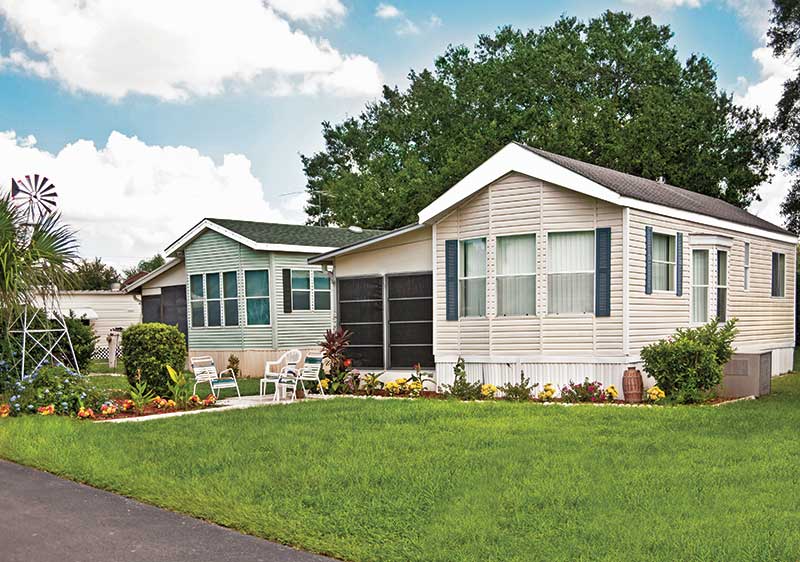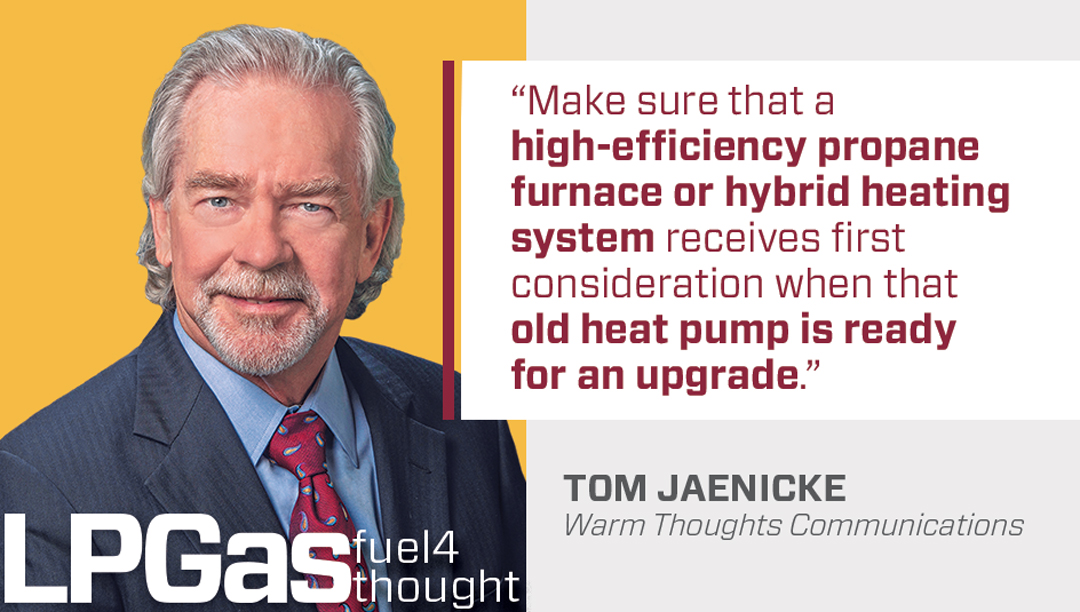Propane sharpens edge in battle against electric heat pumps
In many parts of the country, the electric heat pump still dominates the home heating market. It doesn’t have to be that way, if you want to join in the fight to help change that picture.
High-efficiency propane furnaces and hybrid heating systems using a high-efficiency propane furnace and heat pump combination are ready to take the market back from traditional all-electric heat pumps.
For the last 25 years, the electric heat pump has dominated the new home heating market in warm-to-moderate climates and has even made inroads into cold climate zones, as well. Why? Well, for the same reason that electric water heaters are still popular – they were the cheapest (not the best performing) products that would heat and cool.
The housing demand and building boom of the 1990s and the first few years of this century created a competitive atmosphere where a lot of corners were cut in residential construction, including the choice of “contractor grade” HVAC equipment. Now, almost half of the heat pumps in homes today are reaching the end of their relatively short life cycles. A high-efficiency propane furnace has nearly twice the operating life of an electric heat pump and provides more comfort while using less energy.
What is a heat pump?
Now let’s get into heat pump basics and define the target. The common electric heat pump uses electricity to operate the heat exchange process of cooling the home in the summer and heating it in the winter. The electric heat pump usually uses electric strip heat for cold weather backup when temperatures drop too low to extract enough heat from the outside air to warm the home. This most common type of heat pump is called the air source heat pump (ASHP).
Heat pumps were originally designed to cool, and they still offer efficiency advantages in this area, but they fall far short of providing economical and comfortable home heating and energy savings in the heating mode.
Much less common, but a growing threat to propane marketers, is the ground source heat pump (GSHP), or more commonly referred to as geothermal or geoexchange. No matter how wonderful and magical the GSHP is portrayed by geothermal proponents, it is still just an electric heat pump. Instead of sourcing the heating and cooling from the air like the ASHP does, the GSHP extracts heating and cooling from the ground, using water or other fluid for the heat exchange. The GSHP may offer a low monthly operating cost, but when compared with the high installed cost of a properly engineered GSHP system, the payback will often take 10-20 years or longer, even with government subsidies.
Relatively new on the scene is the hybrid heating system (HHS), which uses the electric heat pump for what it does best – cooling. The electric heat pump is combined in the same unit with a high-efficiency gas furnace for what that does best – heating. This combined unit is a hybrid system because the electric heat pump can cool the home and carry some of the lighter heating load in warmer temperatures and turn over the main heating load to the high-efficiency gas furnace as the outside temperature drops. In the heating season, the gas furnace handles the primary heating load, and in the summer the propane furnace’s partner, the electric heat pump, takes over the cooling load.
Finding solutions
Here are the top three complaints from consumers who try to heat their homes with electric heat pumps, along with the propane solutions:
1. “The house feels cold.” – Heated air produced by the average heat pump comes from the registers at about 90 degrees, compared to your body temperature of 98.6. Yes, 90-degree air will feel cool. Register discharge temperatures will jump into the 120-degree range when a high-efficiency propane furnace is installed. Problem solved.
2. “My electric bills are high.” – Heat pumps, both ASHP and GSHP, run on electricity – a lot of electricity. When the heat pump can’t keep up with the heating demand, the electric strip heat jumps the electric bill even higher. Installing a high-efficiency propane furnace saves energy and increases comfort.
3. “I run out of hot water.” – It is common practice for an electric heat pump to be installed in an all-electric home, so the homeowner must accept an electric storage tank water heater with the package. Cold showers can result. A high-efficiency propane storage tank water heater or propane tankless water heater will boost hot water delivery and lower the electric bill.
It is time to network with HVAC contractors, builders, remodelers, energy raters and your customers to make sure that a high-efficiency propane furnace or hybrid heating system receives first consideration when that old heat pump is ready for an upgrade.
For more information, visit the Propane Education & Research Council’s Resource Catalog to find specifics about the hybrid heat pump solution.
Related content:
- Randy Doyle talks Heat Pump Helper technology at Growth Summit
- Industry promotes adoption of hydronic heating technology
- Space heating solution builds momentum in residential market
- Hydroheat: Propane’s best response to electrification
- Heat Pump Helper leaders converge on Ohio home
Tom Jaenicke is vice president of propane marketing services for Warm Thoughts Communications. He can be reached at tjaenicke@warmthoughts.com or 810-252-7855.



















I have now the electric air heating system and electric water heater.I want to convert this system to LP Gas including heating,cooling,cooking,hot water.Thanks
I’m looking for back up heat source for propane. For some reason there is a shortage and it is being rationed. All the oil and gas drilling and no propane. One can not count on propane alone for there primary heat source.
So if you get a hybrid heating system, can you still go though you regular propane company?